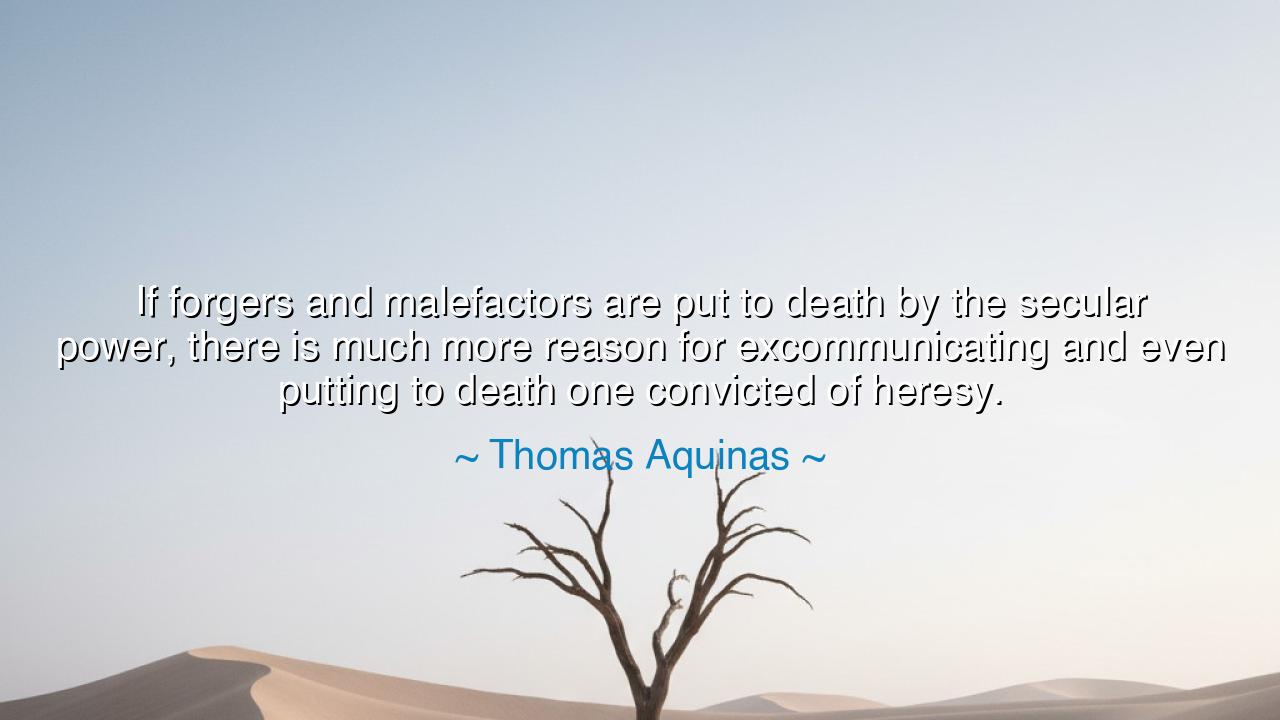
If forgers and malefactors are put to death by the secular power
If forgers and malefactors are put to death by the secular power, there is much more reason for excommunicating and even putting to death one convicted of heresy.






“If forgers and malefactors are put to death by the secular power, there is much more reason for excommunicating and even putting to death one convicted of heresy.” — thus wrote Thomas Aquinas, the great doctor of the Church, whose intellect shaped the very architecture of medieval thought. To the modern ear, these words ring with severity, even cruelty. Yet to understand them, one must step into the world in which they were written — an age when faith was not merely a private belief, but the foundation of civilization itself. For Aquinas, the world was not divided between church and state as we know it now; it was a single order — a divine harmony where truth was the breath of existence, and to deny that truth was to endanger the soul of humanity.
The origin of this quote lies in the heart of Aquinas’ theological system, woven through his Summa Theologica, a monumental work written in the thirteenth century. At that time, the Church stood not only as the guardian of spiritual life but also as the unifying power of the West. Heresy — the deliberate denial of sacred truth — was seen not as a mere intellectual difference, but as a poison to the very soul of society. If the forger corrupted the currency of the realm, then the heretic, in Aquinas’ view, corrupted the currency of salvation. Both endangered the common good, but the heretic’s crime was greater, for it imperiled eternal life. Thus, Aquinas reasoned that if the state could justly punish treason against the king, the Church could justly punish treason against God.
It must be understood that Aquinas did not delight in death; he was, above all, a man of reason and order. His logic, though harsh by modern standards, was consistent within his time’s vision of justice. The truth of God was the light that held back chaos. To deny it was not only to damn oneself but to threaten the spiritual fabric of all creation. Heresy, to him, was not opinion — it was rebellion against truth itself, a kind of cosmic treason. And if treason against a mortal king could be punished by the sword, how much more severe, he thought, should be treason against the King of Heaven?
We might look to the story of the Cathar heresy in southern France as an illustration of this belief. The Cathars preached that the material world was evil and denied the sacraments of the Church. To the medieval mind, such ideas were not mere eccentricities; they were seeds of spiritual ruin, leading souls away from salvation. When the Cathars’ influence spread, it threatened the unity of Christendom itself. The Church, believing that the infection must be cut out to save the body, called upon the secular powers to destroy it. To modern eyes, this appears as darkness — but to Aquinas and his contemporaries, it was seen as surgery upon the soul of the world.
And yet, there is tragedy in this vision. For in its pursuit of purity, the Church often extinguished the very flame of mercy that burned in the heart of its own Gospel. What Aquinas saw as defense of truth, later generations saw as the shadow of fear — the fear that truth was too fragile to endure questioning. But history teaches us that truth needs no sword to defend it, for it is eternal and cannot perish. Indeed, many who were once called heretics — men like Galileo, who spoke of the heavens, or Giordano Bruno, who dreamed of infinite worlds — now stand as martyrs of human curiosity, their suffering the price of our progress.
Still, we must not condemn Aquinas too swiftly. His words, severe as they sound, arose from a time when faith and reason were seen as twin pillars of the same divine order. He believed deeply that to preserve truth was to preserve humanity itself. If we, in our age, have come to see freedom of thought as the truest expression of that same truth, then we are not his enemies, but his inheritors — for we have built upon the foundations he laid. Aquinas sought certainty; we seek understanding. Both, in their own ways, are paths to light.
So, my child, let this be the lesson: guard the truth, but do not smother it. Seek conviction, but temper it with compassion. The line between belief and tyranny is drawn not by power, but by humility — the recognition that even our most sacred certainties must bow before the mystery of God. Learn from Aquinas, not in his call for punishment, but in his reverence for truth. Let that reverence guide you, not toward condemnation, but toward understanding. For to destroy in the name of truth is to forget that truth itself was born from love.
In the end, Thomas Aquinas teaches us this paradox: that truth is worth dying for, but never worth killing for. The fire of belief must purify, not consume. If his age used the sword, let ours use the light — for light alone reveals the face of God in both the faithful and the doubter alike.






AAdministratorAdministrator
Welcome, honored guests. Please leave a comment, we will respond soon